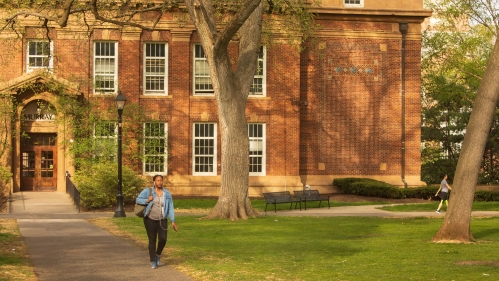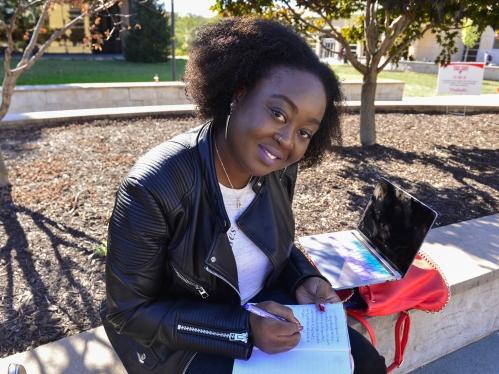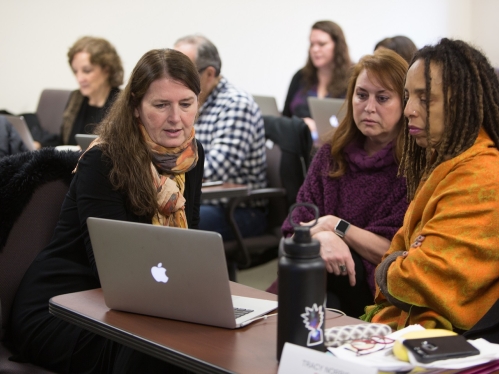
Prospective ACT Students
Can I apply to the ACT program?
The following individuals are eligible to apply for the ACT program:
- Clinicians with a masters or doctorate in a counseling discipline who wish to earn all or part of their LCADC education hours
- MSW students who wish to earn their LCADC hours while taking the courses required for the MSW degree
- Masters or doctoral students in other clinical disciplines wishing to earn their LCADC hours while completing their degree. Examples of clinical disciplines include, but are not limited to
- Psychiatric nursing
- Marriage and family counseling
- Psychology
- Addiction medicine
- Other counseling disciplines
The following are NOT eligible to apply to ACT:
- Students in the Intensive Weekend, 100% online, or blended MSW program
- Postgraduates who do not have a bachelor’s degree
- Postgraduates whose clinical graduate degree is from a school whose graduates are ineligible for a clinical license
To be considered for ACT enrollment, graduate students must be accepted into their graduate program of study (e.g., School of Social Work, Psychology, Nursing, etc.) before submitting their application to the ACT Certificate Program.
Students who already have an earned masters or doctorate in a counseling profession may submit their application directly to the ACT Certificate Program during the next application period.


Applications and Deadlines
Application periods are in spring and fall each year. Late applications will not be accepted under any circumstances.
A committee of no fewer than 3 reviewers provide feedback on each application. Applications are given an overall score from 1-5, and acceptances are based on these scores and the number of students we can admit, given our resources, in each application period.
ACT is a competitive program and not everyone who applies to ACT is accepted.


ACT Tuition and Fees
Tuition costs are the same as for any graduate course in social work at Rutgers.
As a general rule, as long as students are taking graduate courses, they may receive financial aid. However, each student has different circumstances, so be sure to contact the financial aid office at the university, and check with your individual lender. See the following website for details: https://gradstudy.rutgers.edu/financial/financial-information
Note - All ACT students are New Brunswick students, even those taking their classes on the other campuses.
Since ACT is a Certificate (not degree granting) program, postgrads in ACT are considered non-matriculating students; this status may impact eligibility for certain types of education loans.
Financial Award
The ACT Certificate Program originally awarded stipends to students who successfully completed the six ACT courses and experience hours. These stipends were funded by the NJ grant that established the program. However, this grant has ended and there are no stipends associated with the program.


Postgraduate Applications
Already graduated? You may take ACT courses after you graduate by applying for acceptance into the ACT program as a postgraduate, and if accepted, you enroll in the university as a non-matriculating student.
Postgraduates with Clinical Masters Degree
Postgrads with a clinical masters degree may fulfill the work requirement through their employment at a state-licensed substance abuse treatment organization. Those without such employment may enroll in an ACT practicum, as ACT provides dual-credentialed supervision and those hours will accrue toward the work requirement for the LCADC.
Those who already have the CADC as well as a clinical master’s degree have already met the education hours and supervision requirements for the CADC. Thus, ACT is not necessary and you need only to apply for the LCADC through the Certification Board.
Postgraduates WITHOUT a Clinical Masters Degree
Those who have a master’s degree that is not clinical may apply to ACT, but they will need to consult with our advisor to determine if any additional coursework, beyond the six ACT courses, will be required to earn the LCADC.
Transfer Credits
Unfortunately, ACT cannot accept transfer courses or credits from any other program or institution.


Frequently Asked Questions
-
In 2011, the Rutgers University Center of Alcohol Studies and the School of Social Work were funded $3.4 million from the NJ Department of Human Services-Division of Mental Health and Addiction Services to develop an Addiction Counselor Training (ACT) Certificate Program. Dr. Nancy Violette, former Director of Professional Development at the Center Of Alcohol Studies, and Dr. Darcy Siebert, faculty member from the School of Social Work, were co-principal investigators on the project.
The ACT Certificate Program’s primary goal is to educate masters-level clinicians who wish to prepare for licensing in their profession and as Addictions Counselors (LCADC). Dual credentialed clinicians are in great demand in our state and across the country, particularly for leadership positions in organizations that treat both mental health and substance abuse disorders.
The ACT Certificate Program provides a 6-course curriculum that covers all 5 domains and the educational hours needed for the CADC/LCADC. The program also requires experience hours gained through an advanced practicum placement or employment at a DMHAS-approved agency. Students accepted into the program will also receive mentorship and preparation for the licensing exams.
-
The following are eligible to apply to ACT:
- Clinicians with a masters or doctorate in a counseling discipline who wish to earn all or part of their education hours
- Incoming MSW students who wish to earn their hours while taking the courses required for the MSW degree
- Incoming masters or doctoral students in other disciplines wishing to earn their hours while completing their degree
- Psychiatric nursing
- Marriage and family counseling
- Psychology
- Addiction medicine
- Other counseling disciplines
To be considered for ACT enrollment, incoming graduate students must be accepted into their graduate program of study (e.g., School of Social Work, Psychology, Nursing, etc.) before submitting their application to the ACT certificate program. Students who already have an earned masters or doctorate in a counseling profession may submit their application directly to the ACT Program during any open application period.
-
The future of behavioral health treatment will focus on the entire person in the environment, and this will include a focus on co-occurring disorders as well as the life context. The clinical leaders will be those professionals who are equally well-trained to treat clients with addictions and/or mental health issues, as many of the treatment organizations will be offering this comprehensive treatment. In preparation for this change across the state, the Divisions of Addictions Services and Mental Health Services have combined into the Division of Mental Health and Addiction Services, and it is this division that is funding the ACT program.
-
ACT is the first and only program in the state that offers graduate-level addictions courses within an established, matriculated program, that fulfill the educational requirements for the LCADC in combination with practicum placements that provide the supervised hours required for the LCADC. Rather than workshop-based training, these courses are rich, intellectually stimulating courses that provide both knowledge transfer and experiential learning. ACT courses focus not only on the LCADC requirements, but also infuse content about co-occurring disorders, evidence-based practices, and the latest information about the neurological and biological components of addiction and treatment.
-
ACT courses will be available on the New Brunswick and Newark campuses; they will also be held on the Camden campus, if there is sufficient enrollment. Courses are offered in a hybrid format, and in-class sessions are limited to 4 or 5 days each semester.
-
During the initial years of ACT, program participants who completed the six courses and supervised work requirement (practicum placement or employment) received a stipend, awarded at the completion of the program. However, the grant that provided for the stipends has ended and stipends are no longer awarded.
-
The term "dual credential" means that someone is licensed in their profession (for social work the clinical license is an LCSW) and also licensed in addictions counseling (the LCADC is the clinical license). The ACT goal is to train clinicians who will ultimately earn both the LCADC and the clinical license in their profession - LCSW, LPC, etc. ACT is also providing practicum learning instructors who are dual credentialed.
-
Please email ACT@ssw.rutgers.edu with questions. This mailbox is checked regularly and your question will be answered by the most appropriate member of the ACT faculty or staff.
-
ACT is the first and only program in the state that offers graduate-level addictions courses within an established, matriculated program, that fulfill all the educational requirements for the LCADC in combination with supervised practicum placements that provide supervised hours required for the LCADC. Rather than workshop-based training, these courses are rich, intellectually stimulating courses that provide both knowledge transfer and experiential learning. Our courses focus not only on the LCADC requirements, but also infuse content about co-occurring disorders, evidence-based practices, and the latest information about the neurological and biological components of addiction and treatment.
-
Students in the ACT program will take a series of six courses during their time in the MSW program. These courses will substitute for the HBSE distribution course, the Advanced Clinical distribution course, and all three electives. In addition, students will be required to take one extra course during a summer session. Added together, these six courses will provide all the education hours needed for LCADC licensing. The 6 educational courses in the ACT program are as follows:
- HBSE: Addictive Behaviors across the Lifespan (HBSE Distribution Requirement)
- Biology of Addictive Behaviors (Elective)
- Clinical Social Work: Addictive Behaviors I (Advanced Clinical Distribution Requirement)
- Clinical Social Work: Addictive Behaviors II (Elective)
- Case Management in Addictions Practice (Elective)
- Professional Development and Responsibility in Addictions Practice (Elective)
-
Yes. To cover all the content necessary for the LCADC, you need to take the extra course. However, it will typically be offered in a summer session so that you can still graduate with your cohort.
-
No, all coursework must be masters or doctoral level. Also the ACT program cannot accept courses or credits from any other college or institution, even if they are at the master's level.
-
Yes, all students will receive all the education hours required for the LCADC. MSW students will also receive the education hours needed for the LCSW. Students from other disciplines (e.g., psychology, counseling) will receive their LCADC education hours through ACT, but they will receive the clinical hours needed for their clinical license in their own program.
-
If you have the CADC but not a clinical masters degree, applying to our MSW program is an excellent idea...but because you have already met the education hours and supervision requirements for the CADC, ACT is not necessary. You simply apply to the Certification Board upon graduation with your MSW and passing the LSW exam.
-
Courses will be offered in a hybrid format - that is, much of the knowledge transfer content will be offered online, and most of the experiential content will be offered in the classroom.
-
Generally, students can choose from Friday course sections in New Brunswick, Saturday course sections in Newark, and Saturday course sections in Camden (when enrollment is large enough to offer a section). Classes will meet from 9 a.m. to 4 p.m., between three and five times during the semester, with additional online content. Attendance at all in-person class sessions is mandatory.
-
No two courses will be offered on the same dates, so you will not have any conflict with your schedule.
-
Yes, you may take your ACT courses after you graduate. You apply for acceptance into the ACT program as a postgraduate, and if accepted, you enroll in the university as a non-matriculating student. You are then eligible to enroll in the ACT courses.
-
Not all courses will be offered every semester.
-
No... they will be offered in sequence, as needed by the different cohorts. Courses will be offered during the summer session, in addition to spring and fall.
-
The dates that each class meets will be staggered throughout the semester so a student can take more than one required class at a time.
-
Graduate students must agree to complete their practicum placement hours at a state-licensed substance abuse treatment organization to be eligible for the ACT certificate. Social work students will be placed through our practicum learning office; students in other clinical disciplines will complete their practicum placement through their own schools, but in coordination with ACT to insure that they are placed at a site that meets ACT requirements.
Postgraduates with a degree in a clinical discipline may choose to fulfill the required experience hours through their employment at a state-licensed substance abuse treatment facility or through an ACT postgrad practicum placement for which they would pay.
-
Our practicum learning office will have a list of state-funded substance abuse treatment organizations. However, you can also check with your supervisor to be sure. Another source is the treatment directory on the NJSAMS website at http://njsams.rutgers.edu/njsams/. This directory provides a list of agencies that are licensed by the state of NJ for substance abuse treatment.
-
You will receive supervision by a clinician who holds an LSW or LCSW and an LCADC. In some cases, you might have two supervisors, one with each credential. If you are not a social worker, you will receive supervision by someone in your discipline.
-
Our social work graduates are preparing for both the LCSW and the LCADC, so it is important to have both kinds of supervision. The LCADC supervision hours will count toward your LCADC application. For the LCSW, your supervised hours begin accruing after you graduate.
-
You will quite likely complete the 300 supervised hours requirement. However, the license also has a 3000 related work hours requirement, and your practicum placement will cover much, but not all, of this. If you had previous employment in an addictions treatment facility, those hours will count too if you can document them. It will be different for each person, so our practicum learning specialist will help you calculate all of this.
-
This is not currently an option; the School of Social Work requires students to take a concurrent practice course with their practicum placement. We'll work with our practicum learning specialist to determine if this is possible.
-
Tuition costs are the same as for any graduate course in social work at Rutgers. See the following website for details: https://live-ru-rccl-ssw.pantheonsite.io/academics/master-social-work-msw/msw-certificates/addiction-counselor-training-act-certificate/prospective-act-students
-
The general rule is that as long as you are taking graduate courses, you may receive financial aid. However, each student has different circumstances, so be sure to contact the financial aid office at the university, and also check with your individual lender.
-
If you graduate with your MSW in May and take the final ACT course in the summer immediately following graduation, the tuition for that final ACT class is NOT included in your MSW tuition and the financial aid you received for your MSW degree will NOT cover the summer ACT course. Furthermore, since you will have graduated, you would no longer be considered a student at the University; you would have to apply to the School of Social Work as a non-matriculating student to take that final ACT class in the summer. (Note: the final ACT course is offered in the summer ONLY IF there is sufficient enrollment.)
-
The ACT program will provide all 270 education hours in the required 5 domains, fulfill the 30 self-help meeting requirement, provide mock exams and case presentations, assistance with the application, and dual credentialed supervised hours to apply to the LCADC requirement. Participants will also enjoy a streamlined license application process.
-
You will complete all your supervised work hours in 12 core functions, you will attend all the required self-help meetings, you will earn credit for all 270 hours of specialized addictions content in the 5 required domains, and you will earn all the additional required graduate-level counseling hours. These accomplishments will be documented for your LCADC application.
-
Both the CADC and LCADC require 3000 hours of related work experience. Depending upon your previous work experience and the number of practicum placement hours you complete after admission to the ACT program, you may have no remaining work hours or you may have quite a few that you will complete after graduation.
-
You will quite likely complete the 300 supervised hours requirement. However, the license also has a 3000 related work hours requirement. Your practicum placement will cover much of this. If you had previous employment in an addictions treatment facility, those hours will count too. It will be different for each person, so our practicum learning specialist will help you calculate all of this.
-
No, the state can’t require everyone to have both licenses. However, treatment agencies in the state have merged mental health and addiction services, so increasingly they will need to hire people with both licenses. In anticipating the need - and because the treatment organizations have a deadline to have at least 50% of their staff to be properly licensed - our program was funded to train the needed clinicians. Thus, you will be very sought-after on the job market!
-
Your LCADC license application requires 300 work hours in 12 different functions supervised by an LCADC. We will provide that for your practicum placement, and/or you can negotiate for that supervision when you take a paying job. Your supervised work hours in your practicum learning will count toward your LCADC. However, you also need supervision by an LSW or LCSW during the practicum placements to meet the School of Social Work requirements. We will guarantee that too, however, the social work licensing board will not allow the supervised practicum learning hours to count toward your LCSW, so you must negotiate LCSW supervision if you are a social worker, or other clinical supervision if you are in another helping discipline, when you apply for your first job after graduation. To add to this complicated situation, the organizations in which you do your practicum placement - or for whom you would need to work for paid employment - must also be state licensed (as an organization).
-
It depends. If you previously passed the CADC exam, then you do not need an exam for the LCADC...you just wait until you receive your LCSW, apply for the upgrade to the LCADC, and you are done! If you do not have the CADC, then the LCADC might require an exam - it depends upon when you take it (before the LCSW, yes; after the LCSW, no). The ACT certificate is not a substitute for the CADC or the LCADC. For the license, you will always need to prepare a lengthy application, and you will receive support for this in the Professional Development course.
-
You will receive a certificate upon completion of all the ACT requirements that you can include with your application.
-
You will have an MSW degree with a concentration in Clinical Social Work and a Certificate in Addiction Counselor Training.
-
Postgraduates may replace the practicum placement requirement with work hours if they are employed by an agency that is licensed by DMHAS for substance abuse treatment OR licensed by DMHAS for mental health treatment and has an addictions treatment program. Postgrads would have to arrange for appropriate supervision by an LCADC or CCS for the hours to count toward the ACT Certificate and the LCADC. The number of hours should be approximately equivalent to a second-year MSW practicum placement (22.5 hour/week x 15 weeks/semester x 2 semesters). Those who do not have such employment may decide to enroll and pay for a postgrad ACT practicum placement, which will provide the appropriate supervision.
-
If you already have the CADC and a clinical master’s degree, then you need only to apply for the LCADC through the Certification Board.
If you have the CADC but not a clinical masters degree, applying to our MSW program is an excellent idea...but because you have already met the education hours and supervision requirements for the CADC, ACT is not necessary. You simply apply to the Certification Board upon graduation with your MSW and passing the LSW exam.
-
We cannot accept transfer courses or credits to the ACT program from any other program or institution.
-
Application periods are in spring and fall each year. Check the ACT website main page for exact dates.
-
We have a committee of no fewer than 3 reviewers, all of whom provide feedback on each application. Applications are given an overall score from 1-5, and we determine acceptances based on these scores and the number of students we can admit, given our resources, in each application period.
-
If you have missed the application deadline, you must wait until the next application period. Dates will be announced on the website, and sent to all MSW students and all clinical programs on Rutgers campuses.
-
Yes, not everyone who applies to ACT is accepted, because this program is for excellent students who are committed to working in the addictions field. For our first application cycle, we received a large number of quality applications, and as a result, we have a highly qualified group of participants in our first cohort.
-
You will apply to the program as instructed on the program website. If you are accepted, you will be contacted by an advisor who will help you through the process of enrolling as a non-matriculating student at Rutgers prior to your enrollment in ACT coursework.
-
Absolutely! This is a cross-disciplinary program that is being offered through the School of Social Work. If you are currently a masters student in another clinical program, we will work closely with your administration to be sure your needs are being met. If you are a post-grad from another discipline, you are very welcome as well!
-
No, you must choose one certificate to complete while you are in your MSW program. Certificate programs use your advanced distribution and elective course slots for their specialized coursework. All certificates are valuable. Our ACT program is unique in that it goes beyond the certificate and prepares you for licensing, so this goal is different from the other certificate programs. Your decision should be based on your career plans.
-
No. The LCADC requires additional hours of general counseling courses that you will not receive if you are in the MAP track. Other certificate programs in the School of Social Work do allow MAP students to participate.
-
At this time, students enrolled in the Intensive Weekend program cannot participate in ACT. If you wish to participate in ACT, you will need to either wait until you graduate from the IW program, or transfer from IW into the regular MSW program.
-
We agree...addictions co-occur with many other social problems. You may take additional electives, but the ACT program requires 4 electives already, so the others would be in addition the 6 required ACT courses. Alternatively, you can take other courses in continuing education after your receive your graduate degree.
-
Pursue what you love. Be passionate about your problem and population, and that enthusiasm will translate into academic success, great job interviews, and multiple employment opportunities. However, remember that finding the right job is not a sprint - it is a marathon. You have to train and prepare, and then stay committed to reach the finish line.
-
Yes, you can find pre-approved trainings that count toward the 270 contact hours in the 5 domains required for the LCADC. However, people in the field report that it can take several years to put together all the required courses, and that the approval process, once they complete their hours, can be very time-consuming. Our ACT participants will receive a streamlined approval process in addition to the education hours, self-help meeting attendance requirement, and supervised practicum learning hours.
Another option might be the NJ Prevention Network’s courses. These are offered in a workshop format, and the cost may be covered if you have employment in a state-licensed substance abuse treatment organization. You should contact NJPN for the details.
-
The Division of Mental Health and Addiction Services has marketed our ACT program extensively to their licensed treatment organizations. A substantial percentage of these organizations do not currently have the proper proportion of licensed staff, and their organization license (and funding) is in jeopardy if they are not in compliance. For this reason, the graduates of our program will be in high demand, as they will be close, if not ready, to earn their license upon completion of the ACT program. Thus, you will have a much better chance of getting a job compared with those who have not completed the ACT program. We anticipate that many of our graduates will receive job offers from the organizations for which they do their practicum placement hours. We also plan to develop a section on our website devoted to linking hiring organizations with our graduates.
